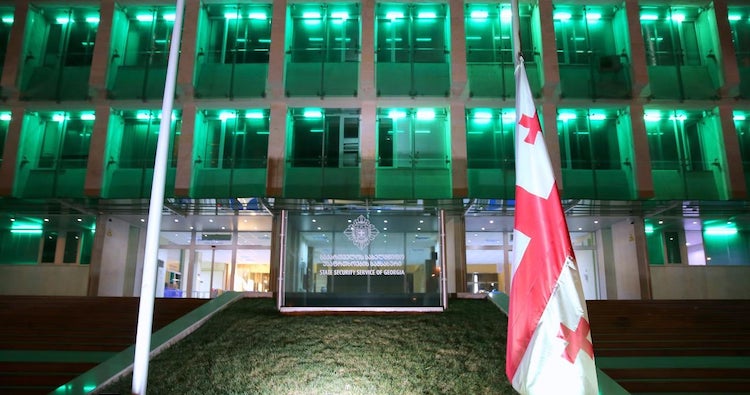IDFI: leaked files likely point to systematic illegal surveillance

The IDFI states that the files most probably are created by the SSS as they reveal ‘large-scale sectoral (religiously oriented) surveillance, which most likely lasted for years.’ Photo: State Security Service of Georgia.
Allegedly leaked files on clerics and politicians from the State Security Service (SSS) are highly unlikely to be falsified and indicate systematic illegal surveillance, the country’s well-respected, non-governmental Institute for Development of Freedom of Information (IDFI) reports.
Thousands of files containing the personal data of clerics and politicians obtained via alleged illegal surveillance were published on the internet several days ago and sent to various media outlets.
The IDFI’s findings after studying the files show the following:
- The leaked files containing sensitive data from people’s personal lives probably were created between 2014-2021
- The leaked files are highly unlikely to be counterfeited
- The leaked files with high probability are processed by the SSS
- A significant part of the files are probably obtained illegally
- The leaked files indicate a probable systematic illegal surveillance
In our opinion, this information is obtained illegally directly from the SSS...Systematic, large-scale and total surveillance was carried out and most likely, these materials are authentic due to its content and volume,” executive director of the IDFI Giorgi Kldiashvili said.
The organisation reports that some of the documents from the leaked files indicate criminal activities:
The leaked files are mainly focused on activities related to religious issues, however, the documents feature various individuals who are neither clergymen nor have any connection with the public life,” the IDFI reports.
It also reads that data of people employed in international organisations and embassies are also found in the files.
The IDFI states that the files most probably are created by the SSS as the files reveal ‘large-scale sectoral (religiously oriented) surveillance, which most likely lasted for years.’
The organisation calls on the Georgian Chief Prosecutor’s Office to delete the materials or restrict access to them if they are verified.
It also calls on the Georgian parliament to establish the investigation commission and on media outlets to cover the issue ‘in full compliance with the principles of journalistic ethics.’
Deputy Public Defender of Georgia Giorgi Burjanadze stated that the existing legislation in the country makes it easier to carry out illegal surveillance.
A law on covert surveillance was reviewed in parliament four years ago. We have been actively informing MPs about the risks that this law could not provide an opportunity for protecting oneself from illegal covert eavesdropping. We of course appealed against this law to the Constitutional Court and we are waiting for a decision more than three years,” Burjanadze said.
The files have been removed from the internet and are no longer available for the public.
The Georgian Chief Prosecutor’s Office launched the investigation into the case day after the disclosure of the files.
The files contained the personal data of top clerics pointing at alleged crimes such as spying for Russia, taking bribes and sexual relations with minors.
 Tweet
Tweet  Share
Share